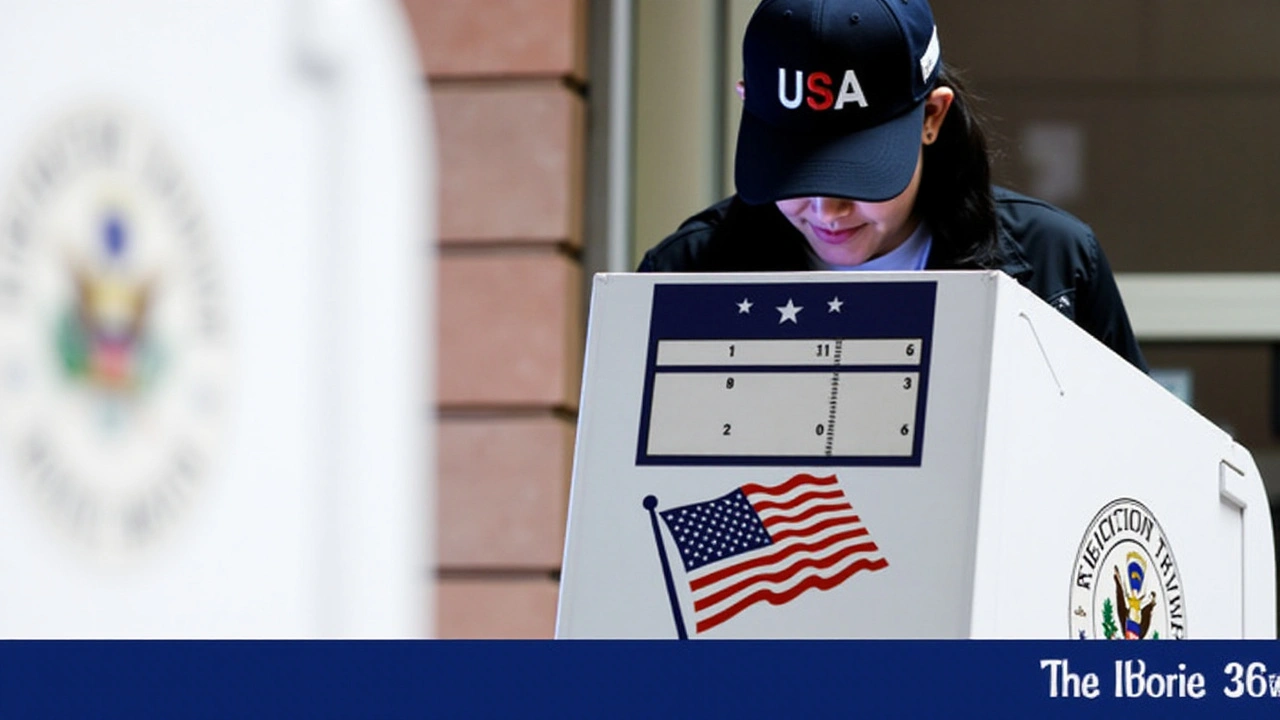The US Presidential Election 2024: A Glimpse of the Nation's Political Future
The air is thick with anticipation as Americans head to the polls for the 2024 US Presidential Election. The stakes are incredibly high as voters make their choice between former President Donald Trump and Vice President Kamala Harris. Millions have already cast their votes, either during the early voting period or on this significant Election Day. The election has seen a remarkable mobilization of the electorate, with key battleground states poised to tip the balance of power in the Electoral College.
The tension has been palpable as the campaigns of both candidates have taken strategic approaches, spending vast amounts on advertising and focused efforts in the battleground states. Pennsylvania, Michigan, Wisconsin, Arizona, and Georgia have all received heightened attention, given their pivotal roles in determining who will assume one of the most powerful positions globally. Pennsylvania, with its 19 electoral votes, remains the linchpin, a state that may very well determine the ultimate victor.
Trump vs. Harris: Campaigns and Promises
Donald Trump has capitalized on his narrative of restoring America's former glory, stirring his base with promises of economic rejuvenation and a return to traditional values. Meanwhile, Kamala Harris has championed issues that resonate with progressive voters, including women's rights, economic equity, and extensive health reforms. Her plan to reduce food and housing costs has struck a chord with working families across the nation, who are grappling with escalating living expenses.
The electoral landscape is such that neither candidate can rest easy. With both campaigns running neck and neck in public opinion polls, the future remains uncertain. Remarkably, over 82 million people have already exercised their democratic right, highlighting the election's intense interest and its potential to significantly impact the nation's trajectory.
Beneath the Surface: Electoral Mechanics and Potential Outcomes
The US uses an Electoral College system, a unique mechanism that often becomes the center of analysis during elections. Rather than directly electing their President, voters select electors who are committed to supporting the candidate they prefer. There are 538 electors in total, and the magic number to secure the presidency is 270. The current environment suggests a highly competitive race where the allocation of these electors can make or break a candidate's chance to win.
The final showdown is particularly intense in seven battleground states: Michigan, Pennsylvania, Wisconsin, Arizona, Georgia, Nevada, and North Carolina. These states carry significant electoral votes and remain competitive, unlike others considered a safe haven for either Democrats or Republicans. If voting patterns hold in non-battleground states, Harris would have 226 electoral votes to Trump's 219, placing immense importance on the 93 electoral votes still undecided.
The Historic Implications of a 269-269 Tie
A tie in the Electoral College is not merely academic; it carries profound implications. In such a scenario, the election would then be determined by the US House of Representatives, where each state's delegation would have one vote. Historically, this route has favored Republicans, suggesting that if it comes to a tie, Trump might have a slight edge. The political drama surrounding such an outcome adds another layer of complexity and anxiety to an already charged election.
The tight contests mirror the divided state of American politics, revealing fundamental differences in vision for the country's future. The polarization has led to escalated stakes where every vote, particularly in swing states, could ultimately decide the fate of the presidency.
A Campaign Marred by Unprecedented Events
The 2024 presidential campaign has not been without drama. It has been marred by unexpected twists and significant events that have captured national and international attention. Notably, the campaign trail witnessed heightened tensions, including two assassination attempts, which underscored the volatile environment surrounding the election. Additionally, the race was shadowed by former President Trump's legal challenges, including a felony conviction, adding another layer of unpredictability to the electoral outcome.
Both Trump and Harris have maintained a poised demeanor in public engagements, ensuring that their core messages remain at the forefront despite the distractions. Their economic platforms, social policies, and vision for America's role on the global stage have continued to rally supporters across varied demographics. The intensity of this election cycle reflects a democratic system inundated by complex challenges and change.
Anticipation as Votes are Counted
The conclusion of the voting process marks the beginning of a meticulous counting procedure that could take days, given the unprecedented voter turnout. The demand for accuracy remains paramount, particularly as the nation prepares to accept the results of what could be one of the most consequential and closely fought elections in modern American history. Voters, political analysts, and international observers focus keenly on the unfolding events, awaiting clarity and resolution.
Kamala Harris plans to spend election night surrounded by family, friends, and supporters at Howard University. Her alma mater has been strategically chosen, reflecting her deep personal connection and appreciation for her formative years spent there. Preparations for a memorable evening are already underway, further building anticipation for what could be an historic night.
All eyes are on America as the world waits to see which direction the country will take in 2024. With both candidates predicting victory, only time will reveal the choice of the American people, shaped by the myriad voices that make up the complex mosaic of this great nation.







Write a comment